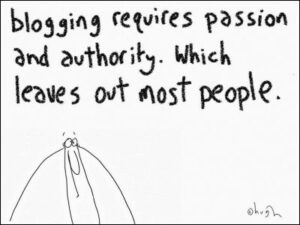Thanks to Dan Schawbel‘s generosity on Twitter I recently discovered an article on AJC.com, “Here’s how blogs can work for you” by Laura Raines.
Raines writes, “Blogs are spreading faster than kudzu in the business world. Why? “Because, when done effectively, they are a great marketing, sales and public relations tool for corporations or entrepreneurs,” said Barbara Giamanco, CEO of Talent Builders Inc., which helps professionals attract business and increase sales by using social media strategies and tools. 
“You know it works when you start getting calls from people you don’t know who want to work with you,” she said. Recently, Giamanco garnered a major corporate client. A friend had referred her, but before calling, he did an online search, and read her LinkedIn profile and her blog, which relates to her core competencies of sales, people development and social media technology. “He liked what I had to say, so before he even met me, I had made an impression as a professional with credibility and integrity,” Giamanco said.”
What Giamanco describes are the fundamentals of relationship-based selling. These are the same principles that successful recruiters apply to their businesses, and a blog can be a fantastic vehicle to demonstrate your expertise and connect with others in the field, as well as with candidates and prospective clients.
“The technology has made it easier than ever to start a blog, and with search engines preferring content that is relevant and recent, blogs often top the results list of a search. That can be a business advantage—-or not.”
It is important to keep in mind that the same rules apply when using social media tools to build meaningful relationships with people. Nobody likes spam and people aren’t interested in “bots” spewing information at them. It’s the difference between the law of attraction and an obvious sales pitch. Developing credibility takes thought and energy. It’s an investment.
Says Raines, “A blog is not a brochure. “One of the quickest ways to fail is to make it an online sales pitch,” Giamanco said. “Nothing turns people off faster than a ‘slick Willy’ hawking his product or services. You want to have a conversation with people and get them to participate.”
Giamanco goes on to say. “People want to do business with people they know, like and trust, but building that relationship takes time. Don’t expect instant results.”
Raines says that you should be authentic when writing on your blog. “Use your own voice and be real,” Giamanco said. “But always treat others with courtesy and respect. If you wouldn’t say it to someone’s face, don’t say it online.”
Brett Borders recently wrote on his blog, Social Media Rockstar, 10 simple ways to show kindness online, “Some of the top social media “rockstars” come across as incredibly nice people. They’ve cultivated a conscious, polished online interaction style that makes other people feel included, welcome, important and appreciated. An “aura of awesomeness” is crowned upon them, in part, because their fans feel good after interacting with them.”
Be prepared to make a commitment. Blogging requires time and effort to draw readers in and keep them interested and engaged. Once you get started you’ll need to post at least several times a week.
However, it doesn’t have to be as difficult or time-consuming as it sounds if you’re smart about it. There are so many things you can write about, and so many ways that you can structure a blog post without spending too much time. I suggest a healthy combination of several different types of articles.
- Write a response to something you have read. It could be something you read in a book, article, or blog post. I don’t comment on other people’s blogs very often but I do write blog posts in response to what I read and link back to it. (Bloggers like it when you do this FYI. Unless your blog post is horrible or you are launching a personal attack on them but let’s assume that’s not the case and I do not recommend either of these things.)
- Do an email interview with someone. I do these a lot. They’re easy to do for both the blogger and the interviewee and very popular with readers, and I love the fact that unless you are a complete idiot this leaves very little room for misquoting someone.
- Answer people’s questions in a blog post. I do this all the time too. Someone comes to me with a question and I ask them if I can write my response in the form of a blog post and I have yet to have someone say no. Plus even if they said no you could just do it anyway and not mention their name so there.
- Obviously you need to write about original ideas that you have related to your field. I’m just saying that not every single post needs to be one of these.
Michael Kogon, CEO and founder of Definition 6, a leading interactive solutions marketing company, suggests focusing on a subject “that draws from your expertise and is broad enough to interest readers. It should be professional, not your personal musings. No one wants to read your thoughts on the universe, unless you’re Stephen Hawking.”
Some of the things that I recommend when blogging:
1. Write about things you care about. Tell us what you do and how you do it and tell us how you feel about what you do and why you do it the way that you do.
2. Let us in to your life. We want insight. While we definitely do not want a play-by-play account of a day in the life of your pet snail we do want to know your interpretation of the information you are sharing with us so don’t just say Apple just released the next gen iPhone. Tell us if you bought it and if so why and if not why and do you like it or love it or hate it and why.
3. Put a picture in your blog post. At least one. Some of us are visual and some of us have absolutely no imagination whatsoever and we need to look at a picture.
4. Don’t be all business and don’t be stuffy. If we wanted to read a textbook we would buy one and no we do not want to read about your cat. That is not what I’m talking about.
5. Have a blogroll. Call it what you want but we want to know what blogs you read so we can learn more about you and also if we like to read your blog (?) we might also like to read some of the blogs that you also like to read.
Last but not least, do not forget:Links are good manners! Chris Brogan says, “Links are good manners. They signal intent. They connote sharing. They help your audience connect better. Link, even if it takes a bit more time. Fair?”
Ready to get started? I suggest you read How to get a job by blogging in order to learn how to set up the kind of professional blog that will get you hired. This is an excellent article that walks you through the process, step-by-step, with links to and explanations about the things you’ll need. And then check out and bookmark @Animal’s guide to basic HTML for bloggers.
About Stephanie:
 Stephanie is Founder and CEO, Radiant Veracity in Atlanta, Georgia, at the intersection of Talent + Social Media.
Stephanie is Founder and CEO, Radiant Veracity in Atlanta, Georgia, at the intersection of Talent + Social Media.
She is a National Careers + Workplace Columnist for Examiner, a division of Clarity Media Group owned by one of the largest media investment companies in the world. There she authors a highly-regarded career and job search advice column for 70 major markets nationwide.
With more than 15 years of experience in corporate recruiting and executive search, Stephanie works with hiring managers, HR executives, business owners, and recruiting firms on recruitment and retention strategy including how to better utilize social media for talent acquisition and employee communication.
By Noel Cocca
CEO/Founder RecruitingDaily and avid skier, coach and avid father of two trying to keep up with my altruistic wife. Producing at the sweet spot talent acquisition to create great content for the living breathing human beings in recruiting and hiring. I try to ease the biggest to smallest problems from start-ups to enterprise. Founder of RecruitingDaily and our merry band of rabble-rousers.
Recruit Smarter
Weekly news and industry insights delivered straight to your inbox.





